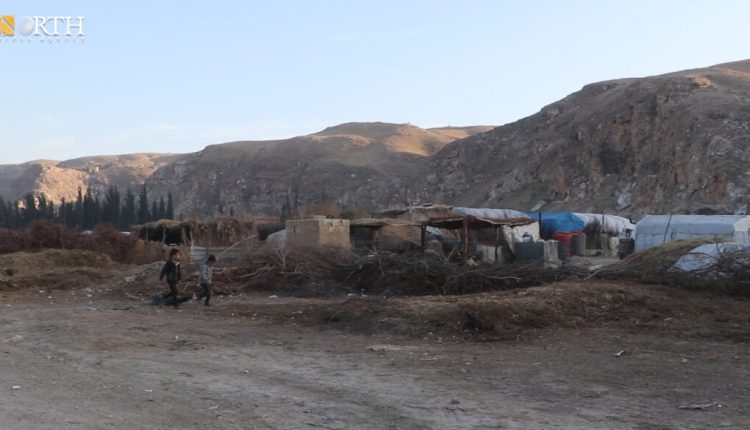
By Hakim Ahmad
RAQQA, Syria (North Press) – IDP families in the makeshift camp of al-Yunani, in the countryside of Raqqa Governorate, north Syria, were affected by recent rainfall in early December due to worn-out tents and a weak humanitarian response from INGOs and the institutions of the Autonomous Administration of North and East Syria (AANES).
The situation is similar in the 53 makeshift camps in Raqqa countryside, housing over 14,000 IDP families from different areas of Syria.
Faraj al-Hussein, 40, has been living with his family in a tent in the al-Yunani camp since 2018, which also needs to be renewed, as it does not protect them from rains and cold weather.
He told North Press that he receives food aid once a year and complains about the shortage of bread rations and not receiving heating fuel.
Basic needs
The Camps Office in Raqqa directed an organization to assist affected families in the al-Yunani camp. Addressing makeshift camps needs funding, efforts, and a long-term program.
The al-Yunani camp houses 244 displaced families, while the total number in Kasarat area reaches 1,000 displaced families from various Syrian areas.
Muhammad al-Jarad, 45, an IDP from Deir ez-Zor Governorate, eastern Syria, resides in al-Maqas camp. “Old tents no longer protect from cold and rain. Some lack blankets, and heating fuel distribution is delayed,” al-Jarad said.
A liter of unsubsidized heating fuel costs 8,000 SYP, (about $0.5), which is unaffordable for the IDPs, according to al-Jarad.
The AANES allocated 300 liters of fuel for each family at 325 SYP for each liter, but distribution is delayed despite harsh winter conditions.
Al-Jarad highlighted insufficient bread rations, saying that everyone receives around 2.5 loaves per day.
Limited Response
Food distribution absence and lack of free healthcare centers are concerns for the IDPs in al-Yunani, al-Maqas, Kasret Muhammad Ali, and sahlat al-Banat camps.
The AANES and humanitarian organizations aim to consolidate camps in order to provide better support to the IDPs.
The IDPs in makeshift camps face dire living and economic conditions, and work for low wages.
Muhammad al-Bakri, Camps Office director in Raqqa’s Civil Council, told North Press that they are about to finish fuel and bread cards at low prices.
Al-Bakri said that they have called on INGOs for food and healthcare support, but only three INGOs provide aid which is still “limited”.
The local responsible for the camps said that the IDPs’ tents are dilapidated and have not been renewed for three years.
INGOs cite conflicts in Ukraine, Sudan, and Gaza have affected their response to IDPs in Syria who still need assistance and unable to return home.
